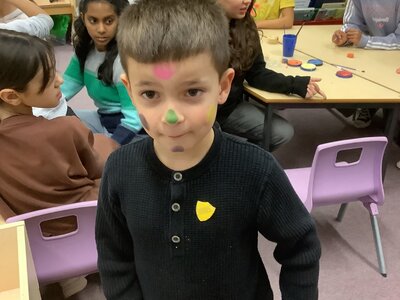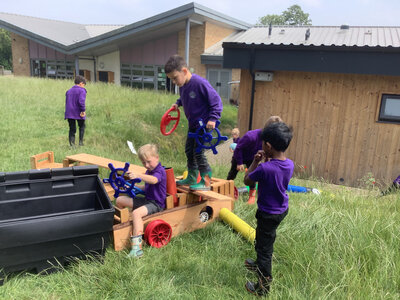- We offer an ambitious curriculum rich in wonder and memorable experiences.
- We provide a stimulating environment, which provides exciting opportunities to promote challenge, exploration, adventure and a real love of learning.
- It is our intent that all children develop physically, verbally, cognitively and emotionally in a safe environment which values everyone equally. We aim for our children to be confident and independent, to believe in themselves and interact positively with others.
- We believe that play is an integral part of learning, and this is at the heart of our early years curriculum.
- We believe that the correct mix of adult-directed teaching, adult-scaffolded play and uninterrupted child-initiated play ensures the best outcomes for pupils.
- We are committed to providing the best opportunities for early Reading and early Maths development and recognise that frequent teaching, as well as daily opportunities to practise and consolidate taught skills, give children the best start in life.
- We strongly believe that warm and positive relationships between staff and children, consistent routines, high behaviour expectations and strong relationships with parents/carers are key to children making good progress.
- We recognise the crucial role that early years education has to play in providing firm foundations upon which the rest of a child’s education is successfully based.
Here is a link to our termly blog: https://sway.cloud.microsoft/a3es8wsOWUS2PppB?ref=Link
The Early Years Foundation Stage curriculum covers 7 areas of learning. There are 3 prime areas:
• Personal, social and emotional development
• Physical development
• Communication and language
And 4 specific areas:
• Literacy
• Mathematics
• Understanding the world
• Expressive art and design.
Our Curriculum
- Our curriculum is based on the Statutory Framework for the EYFS (Statutory framework for the early years foundation stage (publishing.service.gov.uk), Development Matters (Development Matters - Non-statutory curriculum guidance for the early years foundation stage (publishing.service.gov.uk)) and our knowledge of child development. It takes into consideration the starting points of each child and their cultural capital. Therefore, our curriculum will vary slightly each year.
- We have designed our curriculum to provide lots of opportunities for following children’s interests as we believe that the more children lead their own learning, the more they will be enthusiastic and eager to progress.
- We ensure that we learn about countries, festivals and traditions that are important to the children within our EYFS
- We respond to children’s individual next steps and needs.
- For all areas of learning, we have developed a progression of skills document to help us identify children’s next steps. This helps us to support our pupils to reach their full potential as they progress on their learning journey. We are conscious that children do not always learn in a linear way and, when teaching our curriculum, we are mindful of this.
The three characteristics of effective teaching and learning are used when planning for, and guiding learning, for each unique child. These are:
- Playing and exploring
- Active learning
- Creating and thinking critically
- We have developed a text-based curriculum where we link learning to high-quality texts at all possible opportunities. The texts that we select offer our children a rich vocabulary and exposure to experiences beyond their own. We aim for all children to be able to see themselves in some of the texts that we read. This ensures that everyone feels valued and creates an environment where everyone has the confidence to aim high and flourish.
- We ensure that our curriculum lays the foundations for Key Stage 1 and Key Stage 2 by exposing children to language, concepts and significant figures that they will later explore in more detail as they progress through the school.
- Our curriculum has a strong focus on communication as we believe being good communicators is the gateway to all learning.
- We believe in teaching vocabulary and giving the children opportunities to practise using these new words. Every week we focus on a number of Wonder Words, as well as having regular discussions about words that appear in texts. We encourage children to talk in full sentences, to ask questions and to be inquisitive.
- Our pupils take part in lots of rich experiences (such as visits, visitors and immersive opportunities) as we believe children learn best when they are actively involved in their learning.
- We provide high-quality continuous provision and enhanced provision, which allows children to practise and develop skills in all areas of learning both inside and outside. Children also take part in weekly Welly Walks.
- We believe that play-to-learn time provides children with the opportunity to practise/consolidate new vocabulary, skills and knowledge and to explore concepts not yet taught.
- Learning is progressive and, in our EYFS, children’s prior learning is consolidated and built-upon. E.g. favourite texts and songs from pre-school are read/sung in Reception with new texts/songs being introduced.
Educational Programmes
Across EYFS, we use Floppy’s Phonics systemic, systematic phonics teaching programme to teach early Reading and Writing skills. Please see our Phonics page for more information on this.
- We have developed a Maths scheme using a combination of the White Rose educational programme and the NCETM Numberblocks to provide children with a depth of mathematical understanding. This will change depending on what you decide to do with Maths.
- Jigsaw educational programme is used alongside our own carefully planned curriculum to teach Personal, Social and Emotional development. This ensures that we follow a whole-school approach.
- We follow the schools P.E. scheme ‘Get set for P.E. to teach focused P.E. sessions to ensure that skills are built upon as our pupils progress into Key Stage 1. These discrete P.E. sessions are in addition to the daily opportunities offered in our setting.
In Pre-school, we have developed a progression of skills overview and a curriculum that prepares our pupils well for Reception in all areas of learning.
- Through our teaching and provision, we endeavour to ensure that all children are able to access our curriculum, regardless of their preferred learning styles. Teaching and learning opportunities are delivered in a number of different ways such as whole-class sessions, small, guided groups, 1-1 skills-led play and lots and lots of child-initiated play.
- We only ‘remark on the remarkable’. We send ‘wow’ moments to parents using the Dojo app and parents send wow moments back to us from home. Practitioners spend time interacting and communicating with the children and do not spend lots of time writing observations. Instead, they have regular (often daily) conversations to discuss each child’s learning and next steps.
- Every week we write a blog to communicate to parents about what we have been learning during the week. In Reception, the children help to articulate what will be written in the blog.
- Our children are engaged in their learning and show a real love for developing their knowledge and skills.
- Children progress well within each of the 7 areas of learning and the 3 characteristics of effective learning are evident in the children’s play.
- Each child has an individual display, a 'proud place' where their proudest achievements are shown.
- There is a real buzz about Reading in our classes and children build up an impressive vocabulary which we praise and celebrate.
- Children display a deep understanding of number through understanding sequences, quantities, properties and relationships between numbers.
- Pupils recognise their full potential and understand the impact they can make to the wider community.
- Children know that they are valued and feel safe at in their EYFS setting environment.
Our pupils:
- Are confident communicators, expressing themselves well in play, group and 1-1 interactions.
- Are kind to each other.
- Understand about choices and consequences.
- Become increasingly independent throughout their time in EYFS.
- Respect each other and value what makes them different.
- Take risks and celebrate mistakes as something they can all learn from.
- Lead their own enquiries and take responsibility for their own learning.
- Are engaged in their learning and foster a love of learning that they take with them through the school.
- Use both the indoor and outdoor environment as a resource for learning and enjoy exploring in their natural environment.



.jpg)